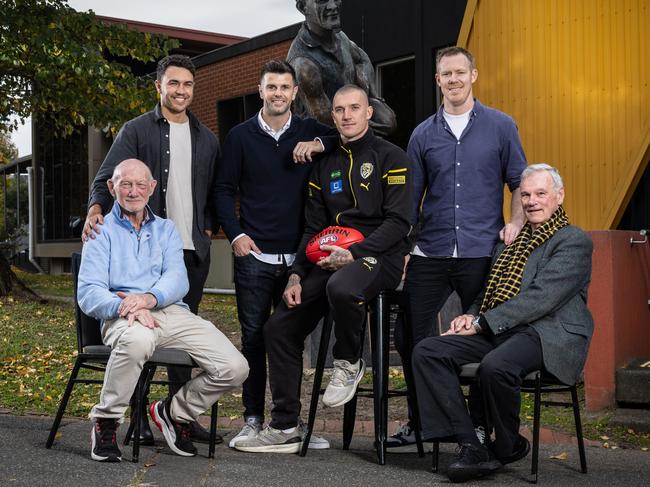Mark Robinson on the journey of Dustin Martin from Castlemaine kid to AFL great
Dustin Martin once said he was born to play AFL. Rarely has a future draft prospect been so right. MARK ROBINSON charts Dusty's journey from shy Castlemaine kid to modern-day superstar.
AFL
Don't miss out on the headlines from AFL. Followed categories will be added to My News.
Never has a prophecy, in terms of footy, been so fulfilled.
“I reckon I was born to play AFL,” Dustin Martin said.
He was 17 then. He was shy and carefully spoken, which has never left him, and clearly had a lashing of youthful haughtiness.
To look at him then, he had a softish face and body, far removed from the chiselled rig of 15 seasons in the big league, and he was taller than what you thought a teenage onballer would be. They all are.
Yet, it was the self-confidence that triggers the memory. And the fact this kid, on this day, harboured boyish hopes and dreams that, over time, would materialise into the phenomenon called “Dusty”.
Born to play AFL? Nah, it would be much bigger than that.
We spoke two weeks ahead of the 2009 national draft, which was a day, unbeknown to everyone, that would transform Richmond from a bedraggled football club to a dynastic powerhouse.
DOWNLOAD THE DUSTY 300 GAME SOUVENIR POSTER HERE
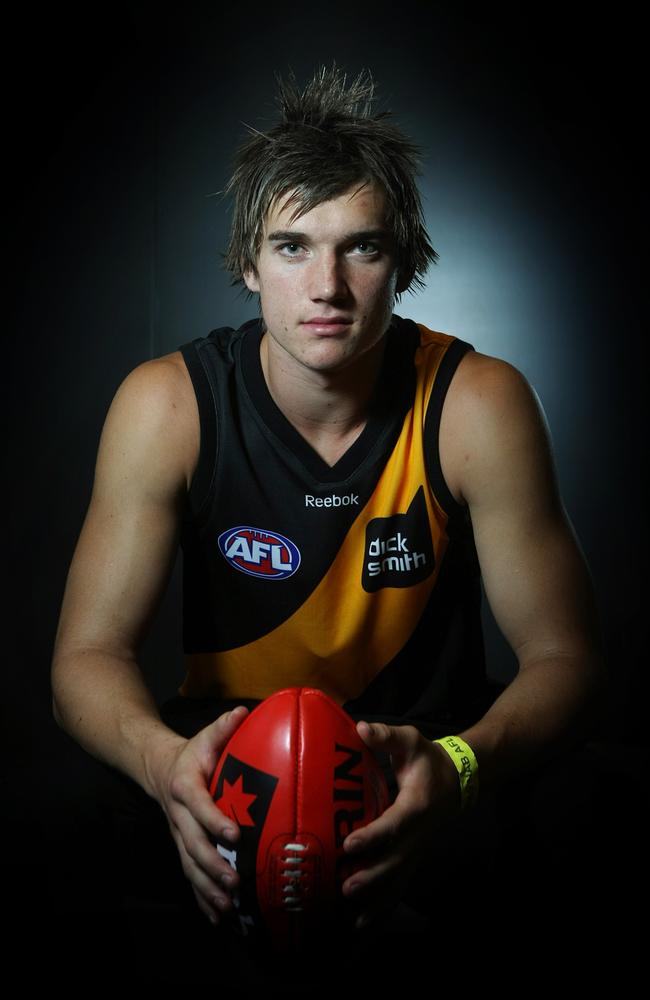
Martin arrived for his only pre-draft interview – in the lounge of Bendigo’s Reservoir Hotel – in the car of Bendigo Pioneers under-18s coach Mark Ellis.
Ellis said Martin was nervous.
“Like any young bloke that has got an ability to play footy, he was nervous about the draft,’’ Ellis said this week. “In some ways, he was no different than what he is now. He was very shy, but felt very comfortable playing footy. He went to the interview not knowing what to expect. At the time, he was very reluctant to talk. It was just a whirlwind for him.’’
Martin hadn’t sat for a media interview previously – and to be honest, not that many since – and was probably wary of what he was to be asked.
Like, why did he leave school when was 15? Only weeks before, Port Adelaide had probed him about exactly that at its pre-draft interview.
“I think I was talking to Port Adelaide and they asked me about when I left school and stuff like that,” Martin said at the time. “Sometimes I’m a little bit embarrassed to say I left that early, but, yeah, Port Adelaide asked me if I was dumb and I said no.”
They said dumb?
“Yeah.”
Harsh?
“I don’t mind.”
Reading that interview again, it was cringe from Port Adelaide.
“I had heard that about Port Adelaide,’’ Ellis said. “But I didn’t talk to him about his draft interview because it was pretty evident he was going to go, it was just a matter of where. I knew Richmond used to come and watch him train (at the Queen Elizabeth Oval in Bendigo) and sit on the other side of the ground. They were doing their due diligence.’’
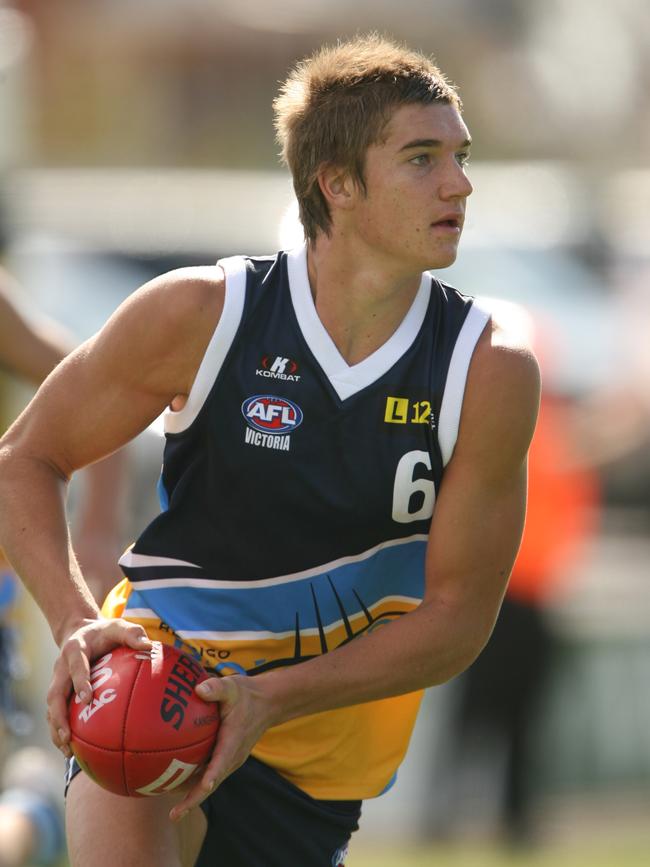
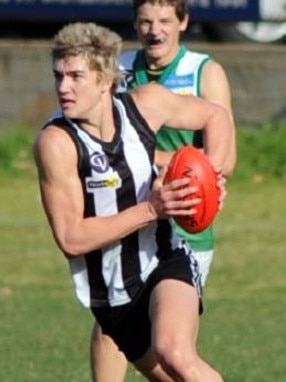
If Martin thought others thought he was uneducated because he didn’t progress past Year 10, Ellis never detected it.
“There was definitely a street-smartness about him, in a good way,’’ Ellis said. “He was very comfortable around people he knew. He was just very comfortable in a footy environment and playing footy. His expression on the ground was a bit different to him off the ground. He always had this unwavering confidence he could play.’’
Ellis coached Martin for half of a season in his bottom-age year at the Pioneers and for all of his top-age year.
In the first year, 2008, Martin played seniors at Castlemaine and also at the Pioneers.
“I can remember Ray Byrne, the regional talent manager, told me to go and have a look at Dustin play,’’ Ellis said. “I can’t remember who they were playing, but it was Castlemaine playing at the Camp Reserve. I will remember this forever. I remember where I was standing. I rang Ray back at halftime and I said, ‘I’m coming home, I’ve seen enough’. I reckon Dusty kicked four or five (goals) to halftime as a 16-year-old. I tell you, I was standing on the wing at the Camp Reserve, the far wing, and I walked away thinking, ‘Gee, this boy could play’.’’
Byrne, a 219-game player at Carlton, Collingwood and Geelong, and who also hailed from Bendigo, also recalled Martin playing for Castlemaine.
“I remember down at Gisborne, a dirty, stinky, wet day at Gisborne,’’ Byrne told Breakfast With Harf on RSN.
“He was only 16, he absolutely dominated. He played like a seasoned player.’’
Martin flourished in the Pioneers’ program. Ellis played him in the midfield – “and wherever he wanted to play’’ he quipped – and said Martin loved the environment – the people, the change rooms, the training.
“He wasn’t hard to coach, he just loved playing footy,’’ Ellis said. “We used to always try to allow players to play on instinct because that’s what’s going to get them drafted.
“When they get to a club they sometimes get changed, but he didn’t. He’d get to training, be one of the first out on the track, and he’d be kicking all different kicks. He’d be kicking different kicks before they became in fashion.’’
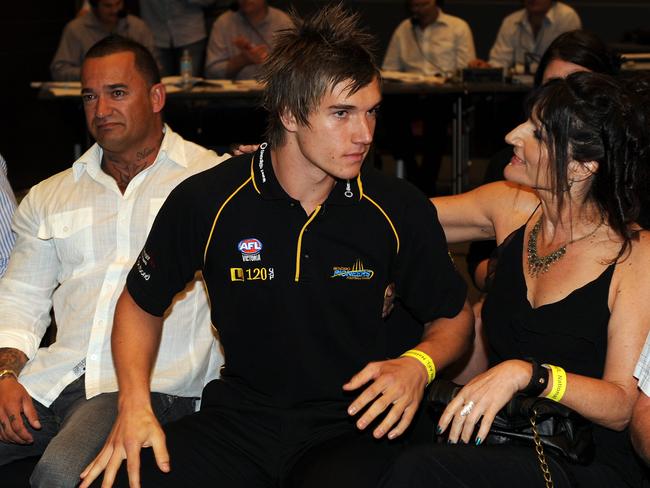
Martin’s burgeoning trademark fend-off was victimised in the under-18 competition.
“He was doing the fend-offs and don’t argues and the umpires were penalising him,’’ Ellis said. “People came to me and said, ‘You’ve got to stop him from doing this’. (Umpires) were getting him for high contact or pushing (because) I don’t think they had seen it before.
“But there was no way known I was taking that out of him. He got a bit frustrated by it, but our theory at the time was to keep playing like you’re playing, mate.
“The thing is, he played on instinct. There’s no way that you could take that out of him.
“He had this knack of being able to play really good footy.
“You go forward to him being drafted and to Richmond’s credit, I reckon they thought, well, we’ve got something pretty special here, and you’d have to ask others, but he probably wasn’t reined-in, (in) terms of being structured.
“I think 17 other (players) were happy to cover for what he could do. It’s a masterstroke by them (Richmond), and it’s great coaching to allow an individual to be an individual if it’s going to help both the individual and the team. And that’s what it did.’’
At 17, Martin was compared to Joel Selwood, who was just 21 at the time, and St Kilda’s tough-nut midfielder Lenny Hayes. He was described as an inside player who won his own ball, was accomplished outside and who liked to bust tackles.
“I like Lenny Hayes and Joel Selwood,” Martin said in that first interview.
“Joel is definitely similar to the way I want to play; just the way he wins the footy, gets it out, gets it again, his decision-making and vision, and without the footy, he’s really good.”
Byrne said Martin was the “best that’s come through’’ the Pioneers.
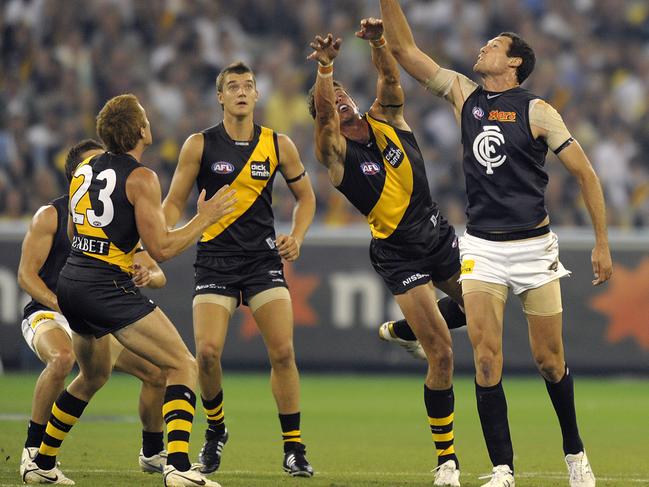
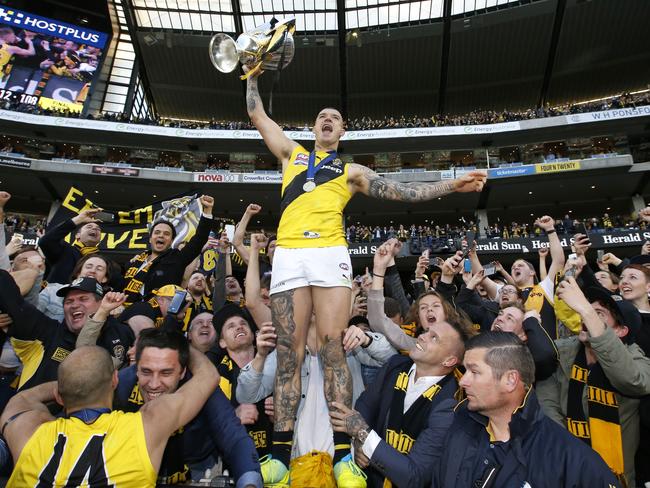
“Joel Selwood was another who was very good, but Dusty was ready-made,’’ Byrne said.
Asked recently what it was he most admired about Martin, Selwood said he remembered being asked by Ellis to meet the teenager in a cafe near the Queen Elizabeth Oval in Bendigo.
“I had a coffee and a chat with a polite, appreciative kid that loved the game,’’ Selwood said.
As a player, he said Martin had an “art very few have’’.
“If he’s close, you go out of the way to give it to him to make something happen,” Selwood said. “Dusty’s mind worked faster on the field than anyone else’s.”
Hayes said Martin had “inspired a whole generation’’.
“It’s the combination of brute power and skill, the precision and penetration with his kicking and the burst of speed and the fend-off,” Hayes said. “No one has been better in the big moments. I also admire that he has been true to himself and done it his way.’’
A concoction of playing and coaching legends this week spoke of Martin’s ability to make moments count. The greats all have that quality. When the moment arrives and when other players don’t want the ball for fear of making a mistake, it’s these moments that make players champions. They want the ball in their hands.
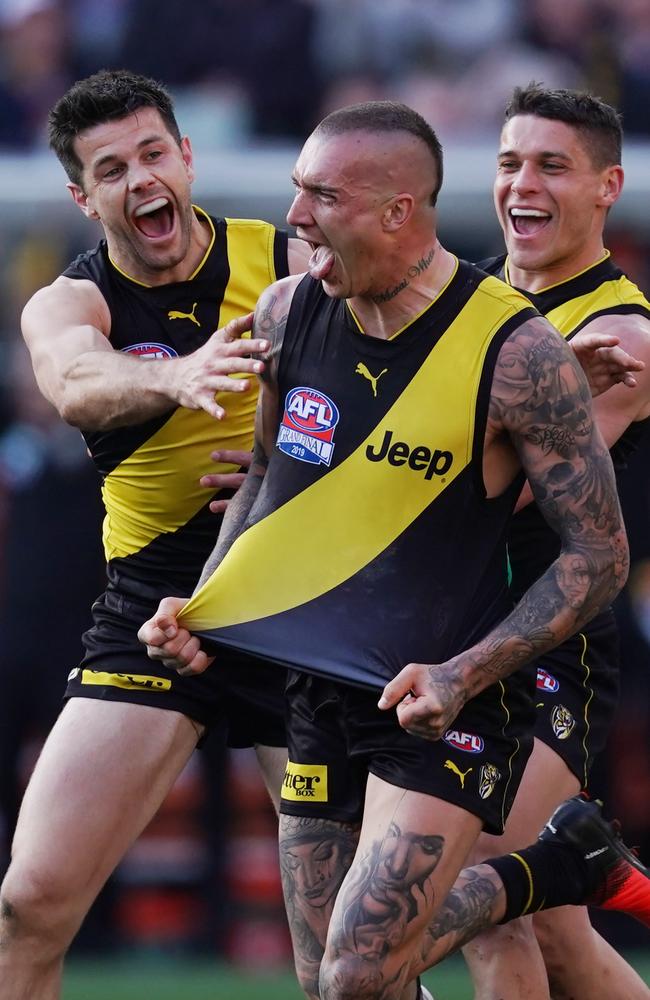
The AFL Season Guide says Martin was among Richmond’s best players in 11 of 13 finals played from 2017-22. He won the Norm Smith Medal in 2017, 2019 and 2020.
Champion Data’s player rankings had Martin No.1 in the 2017 grand final, No.3 in 2019 behind Heath Shaw and Tim Taranto, and No.2 in 2020 behind Jayden Short.
Ranking points are only a guide, but it’s arguable Martin was best on ground in all three of Richmond’s 2017 finals, the 2018 qualifying final, the 2019 qualifying final and grand final, and three of the Tigers’ four finals in 2020. That’s nine of 13 in that stretch.
Ellis has watched Martin’s career, as we all have, and been mesmerised by his September feats.
Ellis played a small role, he said, and wants to believe that Martin is still the humble and respectful young lad he had under his wing at the Pioneers.
“It was a privilege,’’ he said.
“I’ll tell you this, when my mum died, and I hadn’t spoken to Dusty a hell of a lot. He was drafted in 2009 and my mum died in 2013, and I got a text from him.
“I don’t know how he found out or who told him, but he sent me a text saying sorry to hear about Mum dying. You don’t forget that. Regardless of how much dialogue I have with him now, that was from a 22-year-old. I’ll never forget that.’’
More Coverage
